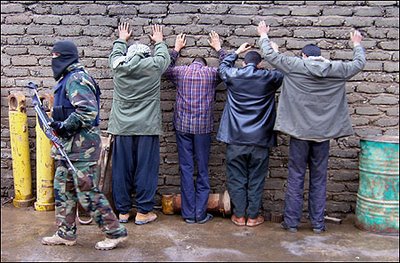 Of all of the lousy decisions that flowed from the U.S.'s botched occupation of Iraq, none was worse that disbanding Saddam Hussein's army, which left security entirely in the hands of the occupiers and ragtag police forces with suspect allegiances.
Of all of the lousy decisions that flowed from the U.S.'s botched occupation of Iraq, none was worse that disbanding Saddam Hussein's army, which left security entirely in the hands of the occupiers and ragtag police forces with suspect allegiances.The consequences of that decision have been obvious and led this week to Iraqi authorities suspending the entire 8th Brigade of the national police, as many as 1,200 police officers, for suspected ties to kidnappings and executions.
The move came after witnesses reported that men wearing police uniforms were behind the Sunday kidnapping of 26 workers at a Baghdad meat processing plant. Six were later found dead.
The decommissioning comes after street protests erupted at one of the police unit's checkpoints in the capital, and U.S. military officials requested that the battalion be recalled.
Said Major General William B. Caldwell IV, spokesman for the U.S.-led coalition:
"There is clear evidence that there was some complicity in allowing death squad elements to move freely, when in fact they were supposed to be impeding their movement, that perhaps they did not respond as rapidly when reports were made. [The Iraqi government] had lost trust and confidence in the . . . division's ability to serve the public due to their poor performance and alleged criminal wrongdoings.The decommissioning is the latest in a series of moves being undertaken by Iraqi and U.S. military authorities to combat the infiltration of Iraq's army and security services by insurgents or sectarian combatants.
Meanwhile, the Ministry of Health reported that 2,667 civilians died violently in September, and 2,994 were injured, a level consistent with the summer's high monthly tallies.
Most of them were victims to death squads, which often pull passersby off sidewalks, seize people from their homes, or drag motorists out of their cars. Their bodies often are found bearing gunshot wounds and signs of torture.More here.
No comments:
Post a Comment